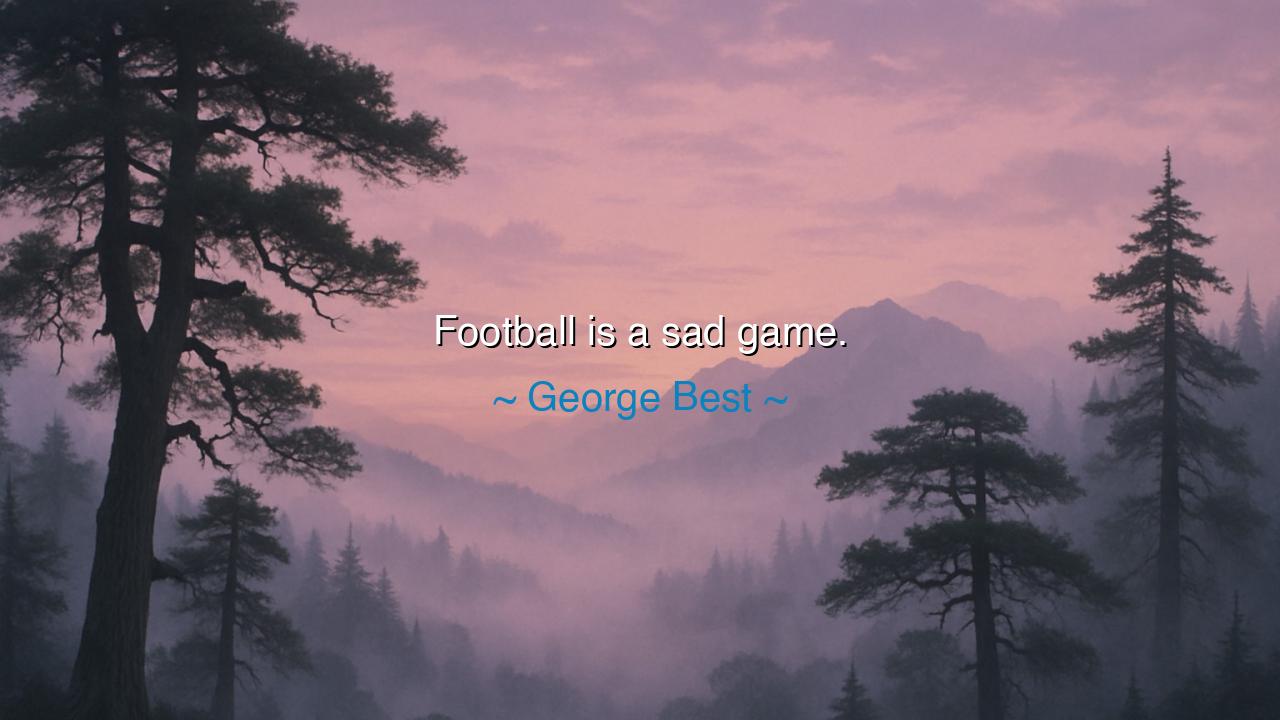
Football is a sad game.






The words of George Best, “Football is a sad game,” strike the heart like a lament sung by a warrior after battle. To the untrained ear, they may sound strange — for is not football filled with cheers, glory, and triumph? Yet in this brief and haunting sentence, Best revealed a truth that echoes beyond the stadiums and the lights: all beauty carries sorrow, and in every victory there hides a shadow of loss. Football, like life itself, is a theatre of fleeting joy — brilliant, intoxicating, and ultimately impermanent.
Best knew this better than most. He was not merely a footballer — he was a poet of motion, a comet blazing across green fields. Yet even he, the man who made defenders stumble and crowds gasp, felt the melancholy that follows greatness. For every goal fades into memory; every roar of the crowd eventually falls silent. The boots are hung, the grass grows again, and the same game begins anew with different players, different dreams. That is why football is sad — because it is a reflection of our mortality. It teaches us that even the brightest glory must one day dim.
In ancient Greece, heroes like Achilles fought not merely to win, but to be remembered. And yet, even Achilles — the swiftest, the mightiest — could not escape his fate. His victories were grand, but his story ended in sorrow. So too does football echo this heroic tragedy. Every player who steps onto the pitch wages war against time, against chance, against the frailty of the body. For a few years, he stands like a god before thousands. Then the cheers fade, and the quiet comes. Fame, like sunlight, cannot be held.
Consider the image of George Best himself, the dazzling genius of Manchester United. His dribbles were like dances, his strikes like lightning. Yet his later years were marked by exile, regret, and longing for the purity of the game that once defined him. The sadness of football, he knew, was not only in losing matches — it was in losing the self that once soared. To love football deeply is to accept heartbreak as its companion. For every fan, every player, every legend eventually learns that the game always moves on.
But there is beauty in that sadness. Football’s sorrow is not despair — it is the tenderness of knowing how fragile greatness is. It reminds us that emotion, not perfection, is the soul of the sport. The tears of defeat, the gasp of a missed chance, the bittersweet farewell of a retiring player — these are the sacred notes of football’s song. Its sadness gives it meaning. Without loss, victory would be hollow. Without the ache of endings, beginnings would have no light.
When we watch a match, we do not simply witness competition; we witness the human condition — striving, failing, rising again. Every pass is a gesture of hope; every whistle, a reminder of limitation. In this sense, George Best’s words are not cynical but wise. Football is sad because it is true. It mirrors the cycle of life itself — birth, struggle, triumph, decay — and teaches us to cherish what cannot last.
The lesson is profound: embrace the sadness that lives within beauty. When you win, savor it — for it will not last. When you lose, honor it — for it, too, is part of the game. In the end, football’s sadness is the same sadness that haunts all great art: it is the shadow cast by love. We grieve because we care. We feel loss because we have known joy. And that, perhaps, is the greatest victory of all — that through a “sad game,” we remember what it means to be fully, gloriously human.






AAdministratorAdministrator
Welcome, honored guests. Please leave a comment, we will respond soon